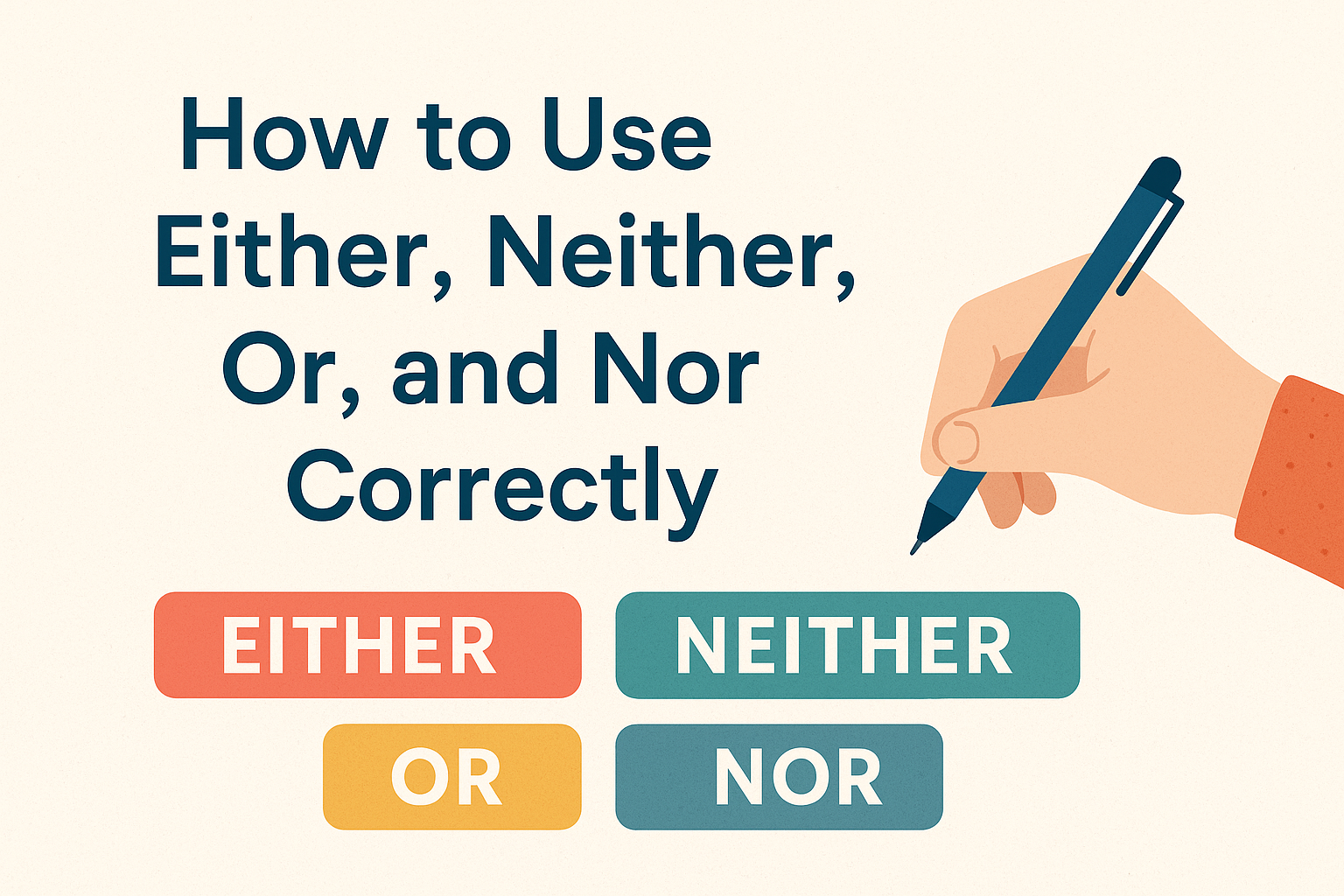In the world of grammar, mastering small yet impactful words like either, neither, or, and nor is critical. These words may seem simple, but they often confuse even seasoned writers. As a platform offering creative writing services, we at Book Planets believe that clarity in language is fundamental—not just for writers, but for readers too. In this guide, we’ll explore how to use these terms effectively so that your writing remains sharp, grammatically accurate, and stylistically sound.
Why It Matters
The misuse of conjunctions like “either/or” and “neither/nor” doesn’t just make your sentences awkward—it can also mislead your audience. Especially for authors working through writing coaching services or undergoing editorial assessment, getting the basics right shows professionalism and attention to detail. Let’s break these down and give you confidence to use them with clarity.
Either/Or: Offering Choices
The construction “either/or” is used to present two options, only one of which will be selected or come true. It’s a classic tool for expressing alternatives.
Correct usage:
- You can either write your memoir or start that novel you’ve been dreaming of.
Here, the sentence presents two possible actions—writing a memoir or starting a novel—but implies that only one will happen.
Common Mistake:
- “You can either write your memoir nor start a novel.” (Incorrect)
This sentence mixes two incompatible words: “either” should always pair with “or.” A quick memory trick: both words begin with vowels—they’re made to work together.
Additional examples:
- Either the plot must improve, or the reader will lose interest.
- You can either self-publish or approach a traditional publishing house.
As a provider of literary editing services, we often help authors revise such confusing constructions during manuscript reviews. Accuracy is not optional—it’s essential.
Neither/Nor: Denoting Negatives
Where “either/or” presents two possible outcomes, “neither/nor” states that neither of the options is true or will occur.
Correct usage:
- Neither the editor nor the writer noticed the typo.
Here, both parties failed to catch the error, meaning the mistake went undetected entirely. “Neither” sets the tone for the negative clause, and “nor” extends it to the second subject.
Incorrect usage:
- I didn’t see neither the cover design nor the back blurb. (Double negative)
The word “didn’t” already negates the sentence. Adding “neither” introduces a second negative, which is grammatically incorrect.
Corrected version:
- I saw neither the cover design nor the back blurb.
Or: - I didn’t see either the cover design or the back blurb.
Both are acceptable but used differently depending on tone and emphasis.
Quick Tip: “Neither” and “nor” both begin with the letter N, making them a natural pair. Use this as a mental cue for future writing.
Either vs. Neither: Subtle But Important Differences
These words also function independently in many cases. Understanding their standalone usage can elevate your sentence structure.
1. Either (used alone):
Means “one or the other” in a singular context.
Example:
- You can sit on either side of the stage.
Here, “either” implies a choice between two equally acceptable options.
2. Neither (used alone):
Means “not one or the other.”
Example:
- Neither of the pens writes properly.
This sentence communicates that both pens are faulty—none are usable.
These nuances might seem minute, but for anyone working through editorial assessment before publishing, they make a world of difference in narrative quality and clarity.
How These Words Function in Complex Sentences
For authors writing multi-layered plots or complex expository content, it’s vital to maintain syntactic balance, especially when using correlative conjunctions.
Example:
- Either the villain confesses by midnight, or the entire city suffers.
This sentence sets up dramatic stakes and uses the “either/or” structure to build suspense—a tactic often coached through our writing coaching services.
Another example with “neither/nor”:
- Neither the main character’s bravery nor their cunning could prevent the tragedy.
This construction works perfectly in tragic literary arcs where all options fail.
Style Tips for Fiction and Non-Fiction Writers
- Use Parallel Structure: Ensure both parts of the sentence follow the same grammatical form.
- ✅ Correct: Either she writes novels or she edits manuscripts.
- ❌ Incorrect: Either she writes novels or editing manuscripts.
- Avoid Redundancy: Don’t pair “neither” with negative verbs like “didn’t” or “wasn’t.”
- ❌ Incorrect: He didn’t neither call nor write.
- ✅ Correct: He neither called nor wrote.
- Stay Consistent: Mixing “either” with “nor” is a common error.
- ❌ Incorrect: Either you stay here nor you leave.
- ✅ Correct: Either you stay here or you leave.
As part of our literary editing services, we ensure your manuscripts follow these grammatical standards, so they’re polished and publication-ready.
When to Use These Constructions in Storytelling
In narrative writing, subtle grammatical tools like these can:
- Create rhythm and symmetry.
- Emphasize character decisions.
- Build tension and conflict.
- Offer stylistic elegance in dialogue or exposition.
Example from dialogue:
- “Either you tell the truth now, or I walk away forever.”
Such statements resonate with impact and decision, making them ideal for emotionally charged scenes.
In non-fiction, especially in how-to guides, biographies, or self-help books, using these conjunctions properly boosts credibility and clarity—two traits essential for reader retention.
Quick Grammar Hacks
- Either goes with Or. Both start with vowels.
- Neither goes with Nor. Both start with N.
- Avoid double negatives.
- Ensure balanced sentence structure.
Final Thoughts
Mastering “either,” “neither,” “or,” and “nor” enhances your command over the English language. These small but mighty words offer nuance, precision, and stylistic flair to your writing. Whether you’re just starting your manuscript or polishing your final draft, understanding how these terms function is critical.
At Book Planets, our mission is to support writers through every phase of their journey. From creative writing services to writing coaching services and detailed editorial assessments, we help you transform grammar from a stumbling block into a storytelling strength.
Need a grammar expert to assess your manuscript? Let us help you refine every word, sentence, and scene with confidence.

